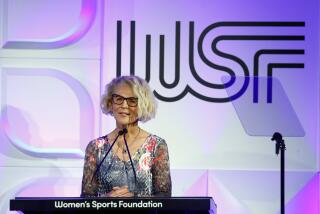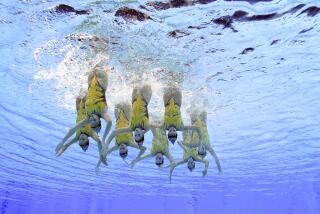Picking Up Her Paddle Where She Left Off : Kayaking: After retiring from sport, Newport Beach’s Sheila Conover qualifies for her third Olympic appearance.
- Share via
The Keys to Kayaking Success, as interpreted by Sheila Conover:
First, after seven years on the U.S. national team and two trips to the Olympics, hang up your paddles and firmly state, “Never again.”
No more year-round training, no more limited-income living because of the lack of sponsors for a little-recognized sport, no more dealing with team politics.
Then, three kayak-free years and a University of California degree later, renege on the “never again” statement and pick up paddles on a casual basis. Begin training once a day, just a few months before the 1991 U.S. nationals in Indianapolis.
Finish by going to Indianapolis and winning every event you enter, take home five gold medals and a berth on the 1992 U.S. Olympic team headed for Barcelona.
“I wouldn’t recommend that method for everyone, but it seems to be working for me,” said Conover, 29, from the U.S. Olympic training center in Lake Placid, N.Y. “The time away was healthy for me, and being back in the kayak is fun again now.”
When Conover finished competing in the 1988 Seoul Olympics, she thought she was through with kayaking once and for all. After taking up the sport in 1981 after graduating from Newport Harbor High School, the years of nonstop training and competition added up to a feeling of “good riddance” once the Seoul Games were over.
“The thrill was gone,” Conover said. “It was no longer exciting or interesting to me in any way. I really thought at that time that I’d stay retired for good.”
Conover replaced kayaking with college, moving from her home in Newport Beach to Berkeley, where she studied environmental geography at Cal. Though she didn’t participate in kayaking at Cal, her competitive instincts led her to a place on the novice crew team in 1989.
Conover’s experience with crew showed her that she still enjoyed sports, including the hours of practice and conditioning.
“I loved everything about Cal in terms of the school, and being on the crew team helped me enjoy my time there even more,” said Conover, who attended Orange Coast College between the 1984 and 1988 Olympics. “I think because I was older and more mature when I went (to Cal), I was able to absorb more and enjoy more.”
Conover, who played volleyball and field hockey and participated in swimming at Newport Harbor, also served as a volunteer assistant volleyball coach at St. Mary’s College in Moraga, Calif., in 1989-90. That role further convinced her that athletics was an important part of her life.
After graduating from Cal in 1991, Conover returned to Newport Beach and decided to give kayaking another chance.
“If it wasn’t fun right from the start, like crew and coaching volleyball was, I would have stopped immediately,” she said. “But it was fun, so I started trying to train once a day to see what I could do.”
Returning to her quickly was the form that made Conover the fastest junior kayaker in the United States six months after she took up the sport in 1981. It also helped her to gold medals in the two-man and four-man kayak at the 1987 Pan American Games. Though Conover felt she was making progress, she had no idea how she would fare at the U.S. nationals after only three months of preparation.
“Before every race, I was so nervous I could barely warm up,” Conover said. “I planned to use the nationals as an indicator to see whether I should try for Barcelona. I thought since I was coming off three years of doing nothing, I shouldn’t expect much.”
Instead, much to her surprise, Conover collected five gold medals. The success in Indianapolis motivated her to continue training for Barcelona, and Conover qualified for the Olympic team in April with a fourth-place finish in the 500-meter singles at the trials in Raleigh, N.C.
In Barcelona, Conover will race in the four-man kayak, and she believes the U.S. boat has a good chance at a medal.
“We’re really optimistic because we have a team now where everyone is ready to sacrifice the individual races for the team boats,” Conover said. “I’m so excited to be a part of it. I feel fit, and it seems like now I can say my comeback was well thought out and executed.”
More to Read
Go beyond the scoreboard
Get the latest on L.A.'s teams in the daily Sports Report newsletter.
You may occasionally receive promotional content from the Los Angeles Times.






